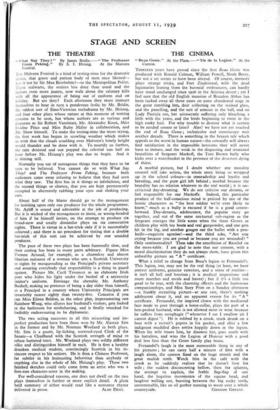THE CINEMA
"Beau Geste." At the Plaza.—" Un de la Legion." At the Curzon.
THIRTEEN years have passed since the first Beau Geste was produced with Ronald Colman, William Powell, Noah Beery,
but not a set seems to have been altered. Of course, memory plays strange tricks, and Fort Zinderneuf, with the dead legionaries leaning from the baronial embrasures, can hardly have stood unchanged since 1926 in the Arizona desert ; yet I feel sure that the old English mansion of Brandon Abbas has been tucked away all those years on some abandoned stage in the great rambling lots, dust collecting on the stained glass, and the panelling, and the suit of armour in the hall, and on Lady Patricia too, her aristocratic suffering only bleaching a
little with the years, and the birds beginning to roost in the high rooky hair. For why trouble to destroy what is certain to be needed sooner or later? Alas we have not yet reached the end of Beau Geste; tectuncolor and stereoscopy wait another decade. There is something in the brazen tale which appeals to the worst in human nature—the cowardly will always find satisfaction in the impossible heroisms they will never have to imitate, and the weak in the disgusting and irrational brutalities of Sergeant Markoff, the Tom Brown bully who kicks over a waterbucket in the presence of the deserters dying of thirst.
A morbid picture, but I doubt whether any morality counsel will take action, the whole story being so wrapped up in the school colours—in comradeship and loyalty and breeding, and the pure girl left behind ; morbid because the brutality has no relation whatever to the real world ; it is un- criticised day-dreaming. We do not criticise our dreams, or feel responsible for our Markoffs. Indeed, this particular product of the half-conscious mind is praised by one of the heroic characters as "the best soldier we're ever likely to know," much as a bully is excused if he is a good centre- forward. Day-dreams, adolescence, the popular story go together, and out of the same nocturnal sub-region as the Sergeant emerges the little scene when the three Gestes as children play with toy boats and real gunpowder, and one gets hit in the leg, and another gouges out the bullet with a pen- knife—exquisite agoniesl—and the third asks, "Are you crying because you are proud or because you are wounded?" Only sentimentality? Then take the crucifixion of Rassilof on the mess-table. I am glad to note that our censors, with a moral discrimination they do not always show, have given this unhealthy picture an " A " certificate.
What a relief to change from Beau's legion to Femandel's. This legion, too, may not be the real thing (at least, we have correct uniforms, genuine exteriors, and a sense of routine— it isn't all hell and heroism ; it is medical inspections and route marches and meals and leaves); but if it's a little too good to be true, with the charming officers and the humorous companionships, and Miss Suzy Prim on a Sunday afternoon —a franldy recruiting picture—at any rate, there's nothing adolescent about it, and no apparent reason for its "A " certificate. Fernandel, the inspired clown with the mediaeval face made to peer through a horse-collar, plays the part of a hen-pecked husband, who is not allowed meat or wine because he suffers from aerophagie (" whenever I eat I swallow air I cannot digest "). He is robbed by a crook, stuck drunk on a boat with a recruit's papers in his pocket, and after a few indignant muddled days settles happily down in the legion. When his wife traces him, he disowns her, goes south with his battalion, and wins the Legion of Honour with a good deal less fuss than the Geste family play boats.
Fernandel's laugh is the most memorable thing in any of his pictures ; he can carry half a minute of film with a laugh alone, the camera fixed on the huge mouth and the great mulish teeth. Watch him in the cafe with the crook as he suddenly realises that he doesn't love his wife ; the sudden disconcerting bellow, then the splutter, the attempt to explain, the feeble flap-flap of one hand, the hopeless movements of the equine head, and laughter welling out, bursting between the big rocky teeth, unstemmable, like an oil gusher running to waste over a whole








































 Previous page
Previous page